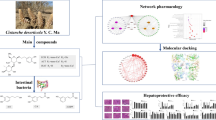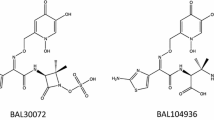Abstract
Possible role of metabolism by the intestinal bacteria in geniposide-induced cytotoxicity was investigated in human hepatoma HepG2 cells. Initially, toxic effects of geniposide and its metabolite genipin were compared. Genipin, a deglycosylated form of geniposide, was cytotoxic at the concentrations that geniposide was not. As metabolic activation systems for geniposide, human intestinal bacterial cultures, fecal preparation (fecalase) and intestinal microbial enzyme mix were employed in the present study. When geniposide was incubated with human intestinal bacteria, either Bifidobacterium longum HY8001 or Bacteroides fragilis, for 24 h, the cultured media caused cytotoxicity in HepG2 cells. Fecalase and intestinal enzyme mix were also effective to metabolically activate geniposide to its cytotoxic metabolite. The present results indicated that genipin, a metabolite of geniposide, might be more toxic than geniposide, and that intestinal bacteria might have a role in biotransformation of geniposide to its toxic metabolite. In addition, among three activation systems tested, intestinal microbial enzyme mix would be convenient to use in detecting toxicants requiring metabolic activation by intestinal bacteria.
Similar content being viewed by others
References
Akao, T., Kobashi, K., and Aburasa, M., Enzymic studies on the animal and intestinal bacterial metabolism of geniposide. Biol. Pharm. Bull., 17, 1573–1576 (1994).
Blaut, M., Braune, A., Wunderlich, S., Sauer, P., Schneider, H., and Glatt, H., Mutagenicity of arbutin in mammalian cells after activation by human intestinal bacteria. Food Chem. Toxicol., 44, 1940–1947 (2006).
Cao, H., Feng, Q., Xu, W., Li, X., Kang, Z., Ren, Y., and Du, L., Genipin induced apoptosis associated with activation of the c-Jun NH2-terminal kinase and p53 protein in HeLa cells. Biol. Pharm. Bull., 33, 1343–1348 (2010).
Gorbach, S. L., Nahas, L., Lerner, P. I., and Weinstein, L., Studies of intestinal microflora. Gastroenterology, 53, 845–855 (1967).
Hou, Y. C., Tsai, S. Y., Lai, P. Y., Chen, Y. S., and Chao, P. D. L., Metabolism and pharmacokinetics of genipin and geniposide in rats. Food Chem. Toxicol., 46, 2764–2769 (2008).
Kang, M. J., Ha, H. W., Kim, H. G., Lee, D. H., Kong, M. J., Ahn, Y. T., Kim, D. H., Shin, B. S., Kang, W., Jeong, H. G., and Jeong, T. C., Role of metabolism by intestinal bacteria in arbutin-induced toxicity in vitro. Arch. Pharm. Res., 34, 687–693 (2011).
Kim, Y. S., Kim, J. J., Cho, K. H., Jung, W. S., Moon, S. K., Park, E. K., and Kim, D. H., Biotransformation of ginsenoside Rb1, crocin, amygdalin, geniposide, puerarin, ginsenoside Re, hesperidin, poncirin, glycyrrhizin, and baicalin by human fecal microflora and its relation to cytotoxicity against tumor cells. J. Microbiol. Biotechnol., 18, 1109–1114 (2008).
Mortelmans, K. and Zeiger, E., The Ames Salmonella/microsome mutagenicity assay. Mutat. Res., 455, 29–60 (2000).
Nam, K. N., Choi, Y. S., Jung, H. J., Park, G. H., Park, J. M., Moon, S. K., Cho, K. H., Kang, C., Kang, I., Oh, M. S., and Lee, E. H., Genipin inhibits the inflammatory response of rat brain microglial cells. Int. Immunopharmacol., 10, 493–499 (2010).
Rowland, I. R., Interactions of the gut microflora and the host in toxicology. Toxicol. Pathol., 16, 147–153(1988).
Sousa, T., Paterson, R., Moore, V., Carlsson, A., Abrahamsson, B., and Basit, A. W., The gastrointestinal microbiota as a site for the biotransformation of drugs. Int. J. Pharm., 363, 1–25 (2008).
Trinh, H. T., Joh, E. H., Kwak, H. Y., Baek, N. I., and Kim, D. H., Anti-pruritic effect of baicalin and its metabolites, baicalein and oroxylin A, in mice. Acta Pharmacol. Sin., 31, 718–724 (2010).
Wang, G., Wu, S., Xu, W., Jin, H., Zhu, Z., Li, Z., Tian, Y., Zhang, J., Rao, J., and Wu, S., Geniposide inhibits high glucose-induced cell adhesion through the NF-B signaling pathway in human umbilical vein endothelial cells. Acta Pharmacol. Sin., 31, 953–962 (2010).
Wu, S., Wang, G., Liu, Z., Rao, J., Lu, L., Xu, W., Wu, S., and Zhang, J., Effect of geniposide, a hypoglycemic glucoside, on hepatic regulating enzymes in diabetic mice induced by a high-fat diet and streptozotocin. Acta Pharmacol. Sin., 30, 202–208 (2009).
Yamazaki, M., Chiba, K., and Yoshikawa, C., Genipin suppresses A23187-induced cytotoxicity in Neuro2a cells. Biol. Pharm. Bull., 32, 1043–1046 (2009).
Yim, J. S., Kim, Y. S., Moon, S. K., Cho, K. H., Bae, H. S., Kim, J. J., Park, E. K., and Kim, D. H., Metabolic activities of ginsenoside Rb1, baicalin, glycyrrhizin and geniposide to their bioactive compounds by human intestinal microflora. Biol. Pharm. Bull., 27, 1580–1583 (2004).
Author information
Authors and Affiliations
Corresponding authors
Additional information
These authors contributed equally to this work.
Rights and permissions
About this article
Cite this article
Kang, M.J., Khanal, T., Kim, H.G. et al. Role of metabolism by human intestinal microflora in geniposide-induced toxicity in HepG2 cells. Arch. Pharm. Res. 35, 733–738 (2012). https://doi.org/10.1007/s12272-012-0418-y
Received:
Revised:
Accepted:
Published:
Issue Date:
DOI: https://doi.org/10.1007/s12272-012-0418-y




